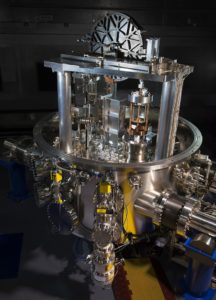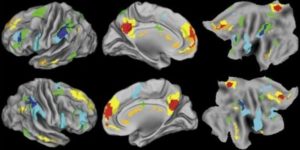 Some news from the always-fascinating world of weights and measures: It seems the object that weighs so close to a kilogram that it’s used as the reference for how much a kilogram weighs no longer weighs a kilogram. It’s only natural that it will lose a molecule here and there over time, so it’s bound to lose a miniscule portion of its weight.
Some news from the always-fascinating world of weights and measures: It seems the object that weighs so close to a kilogram that it’s used as the reference for how much a kilogram weighs no longer weighs a kilogram. It’s only natural that it will lose a molecule here and there over time, so it’s bound to lose a miniscule portion of its weight.
To rectify the situation, scientists will redefine the kilogram as the number of Planck mass that it weighs. They’ll be able to sleep easier at night knowing that the new definition is based on an unchanging constant rather than a chunk of metal subject to the laws of entropy. But why stop there?
It seems to me the scientists weren’t thinking big enough. Wasn’t the necessity of replacing a means of defining a quantity a sign that the quantity itself was arbitrary? Why not create an entirely new system of base units based on the Planck constant?
In the age of quantum computing, the current units by which we measure quantities in our world seem rather outdated. I suggest we replace them with these:
Length: The Jot
One decillion Planck lengths (roughly 16.16 millimeters or .6363 inches).
Mass: The Nub
One million Planck mass (roughly 21.76 grams or .7677 ounces).
Time: The Tap
One tredecillion Planck times (roughly .05391 seconds).
Thermodynamic Temperature: The Pin
Where absolute zero is zero pins, and Planck temperature is one decillion pins (so water freezes below ~1,928 pins and boils above ~2,634 pins).
Amount of Substance: The Cob
The amount of substance of a system which contains as many elementary entities as there are atoms in 1 nub of carbon 12 (roughly one septillion).
Electric Current: The Zip
I don’t have enough expertise in this field to define what this is, but that would be name for it and it would be derived from Planck units.
Luminous Intensity: The Dot
See “Electric Current,” above.
From here, we can create derived units, e.g. for volume (one blip equals one cubic jot, roughly 4.22 cubic centimeters or .86 teaspoons; one chug equals 1,000 blips, roughly 4.22 liters or 1.12 gallons) and velocity (one jolt, meaning jot per tap). We’ll replace everything from the newton to the calorie.
And this system of measurement will eventually spring from the laboratories to the rest of the world. Milk will be sold by the chug and beer by the decichug. Speed limits on the highway will be set at one hundred jolts. Videos will be shot at one frame per tap (two for action-heavy fare). We will finally have a logical and science-based system of measurement to quantify the universe around us for an age in which we start venturing off into the stars.
Of course, every worthy movement must start somewhere, so if you could pass this message along, I’d appreciate it. Thanks in advance.
